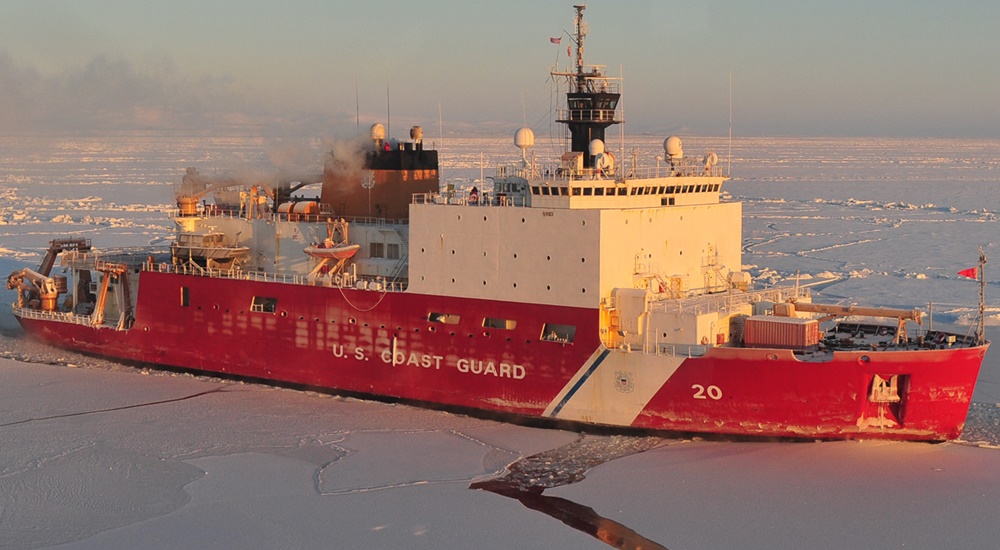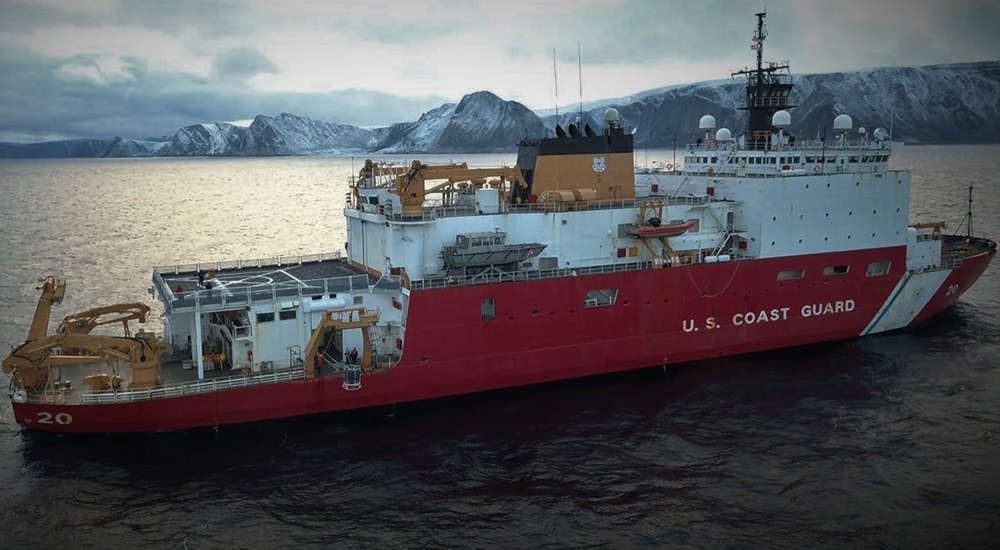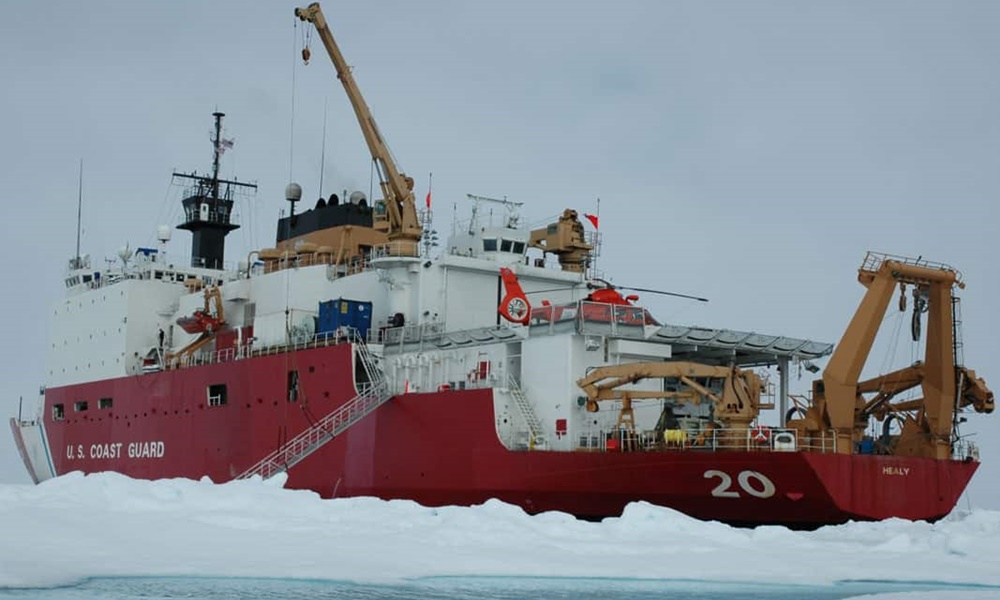USCGC Healy icebreaker
USCGC Healy icebreaker last position
The last location of USCGC Healy icebreaker is in North America West Coast cruising en route to Portland OR. The AIS position was last reported 2 weeks ago.
Current PositionSpecifications of USCGC Healy icebreaker
| Year of build | 2000 / Age: 26 |
| Flag state | Alaska |
| Builder | Avondale Shipyard (Bridge City-New Orleans, Louisiana) |
| Class | WAGB-20 |
| Ferry route / homeports | Seattle, Washington USA |
| Engines (power) | Wartsila-Sulzer (37 MW / 49618 hp) |
| Propulsion power | 12.8 MW / 17165 hp |
| Speed | 17 kn / 31 km/h / 20 mph |
| Length (LOA) | 128 m / 420 ft |
| Beam (width) | 25 m / 82 ft |
| Gross Tonnage | 15150 gt |
| Passengers | 54 - 105 |
| Crew | 31 |
| Decks | 5 |
| Decks with cabins | 2 |
| Last Refurbishment | 2019 |
| Owner | USA government (via United States Armed Forces) |
| Operator | USCG (United States Coast Guard) |
USCGC Healy icebreaker Review
Review of USCGC Healy icebreaker
USCGC Healy icebreaker is a USCG/US Coast Guard icebreaker ("Medium Icebreaker"/class WAGB-20) owned by the USA's government and operated by the USCG (branch of the US Armed Forces). The abbreviation "USCGC" stands for "United States Coast Guard Cutter". The term "cutter" is used only for commissioned vessels with minimum LOA length 65 ft (20 m) and permanently crewed (with assigned personnel accommodated in shipboard cabins).
The vessel (IMO number 9083380) is currently USA-flagged (MMSI 303902000) and homeported in Seattle WA.
The 2000-built icebreaker was constructed by Litton-Avondale Industries Inc (1938-founded as "Avondale Marine Ways"). The shipbuilding company was later acquired by Litton Industries (a large US defense contractor, 1953-founded/2001-defunct) which in 2001 was acquired by Northrop Grumman Corporation (aerospace and defense technology company, 1994-founded). The Avondale Shipyard (2014-closed) was located on Mississippi River's west bank (Bridge City area, near Westwego LA), approx 20 mi / 32 km upriver from New Orleans Louisiana.

The ship operator USCG is the world's most powerful coast guard - an agency specializing in maritime safety and security services, with jurisdiction in both domestic and international waters. As of 2022, the USCG operates 10x Air Stations, 11x Sectors, 2x icebreakers (Healy/medium, and Mackinaw/heavy), 12x Cutters (4x National Security, 4x High Endurance, 4x Medium Endurance), 50x Patrol Boats, 51x Navigation Safety and Rescue Units (aircraft). The USCG has 11x statutory missions that aim to preserve the national maritime supply chain (navigation aids, logistics, ship escort, search and rescue), also providing environmental protection (investigating sea pollution incidents, conducting fisheries boardings), law enforcement (combating organized crime, seizures of ship-transported narcotics, illegal migrants), global scientific and humanitarian operations support, Polar operations (Arctic and Antarctic).
USCG Healy was named after Captain Michael Augustine Healy (1839-1904) - an officer with the US Revenue Cutter Service/now USCG in the period 1865-1903.
The ship's last drydock refurbishment was in 2019 (January thru June), conducted at Seattle's Vigor Industrial Shipyard. The USD 7,3 million drydocking project included renewal and overhaul of the sea valves, modifications to the bow thruster, painting works (underwater hull and ballast tanks), various machinery overhauls (equipment examinations and repairs).
Healy icebreaker vessel details and technology
The vessel's construction started on September 16, 1996 (keel-laying ceremony). The Healy ship was launched/floated out on November 15, 1997, and delivered on November 10, 1999. The icebreaker departed Port NOLA on January 26, 2000, for sea trials. The sea trials were conducted in two regions - in the Caribbean (off Puerto Rico) and in Baffin Bay (between Baffin Island Canada and Greenland). After successfully completing sea trials and transiting the Northwest Passage/Canadian Arctic, the icebreaker arrived in homeport Seattle WA on August 9th, and was officially commissioned on August 21st.
For the hull design and the diesel-electric propulsion system engineering was contracted Kvaerner MARC (Masa-Yards Arctic Research Centre, now "Aker Arctic Technology Oy"/2004-founded Finnish engineering company headquartered in Helsinki Finland) which participated in the construction of the Otso icebreaker.

The ship provides staterooms for 136 people (85 crew plus 51 passengers), including 19x officers, 12x CPOs (Chief Petty Officers/senior non-commissioned), 54x enlisted personnel, 51x passengers (scientists). Chief officers include CO-Commanding Officer (Captain), XO-Executive Officer (Commander), OPS-Operations Officer (Lieutenant Commander), EO-Engineer Officer (Lieutenant Commander), BOSN-First Lieutenant (Chief Warrant Officer/Boatswain), SUPPO-Supply Officer (Chief Warrant Officer), EMCM-Command Master Chief (liaison between the enlisted crew and the ship's command staff).
Until 2005, the icebreaker carried two onboard aircraft (Eurocopter MH-65 Dolphin/twin-engined helicopters). Since 2005, the helicopter support is contract-provided. The aft-located Helideck is a landing platform with capacity for one rescue helicopter, and in the adjacent Helicopter Hanger can be stored two helicopters on 2 levels (upper and lower).
Cargo Deck has capacity to accommodate 8x ISO containers (intermodal/shipping containers) used as science labs and workstations. The ship has 3x service boats: an ASB-Arctic Survey Boat (38 ft / 12 m, starboard mounted), plus 1x CBL-Cutterboat-Large, and 1x RHIB-Rigid Hulled Inflatable Boat (each sized 26 ft / 8 m, mounted portside and starboard).
Signature structures and facilities include: open decks (Aft A-Frame, Starboard A-Frame, Cargo Holds 1-2-3, Sonar Wells, ISO vans, Bow Deck, Fantail Deck), Main Deck (deck 1/laboratories), Bridge Deck (deck 5), Deck 2 (Science Berthing), Science Laboratories. Science labs' safety equipment includes Fire Blankets, Electrical Outlet Cutout Switches, Eye Wash/Shower Deluge System, Spill Response Kits. Science facilities include Main Lab, Wet Lab (36 m2 / 390 ft2), Bio-Chem Lab (Biological-Chemical Analysis), Electronics Lab, Future Science Lab, Meteorological Lab, Photography Lab, Dry Lab and Assembly Area (14 m2 / 150 ft2), ISO-Container Lab (10 m2 / 110 ft2), Freezer, Refrigerator, 2x Climate Control Chambers, 2x Staging Areas for scientific operations - Aft and Starboard (with a bridge crane and hoist, weather deck, direct access to the Wet Lab).

The icebreaker's scientific missions are usually themed on marine geology, oceanography, meteorology. The ship provides 4200+ ft2 (390+ m2) of onboard scientific lab space, including Open Working Decks - Forward (500 ft2 / 47 m2), Aft (3000 ft2 / 279 m2), Starboard-Aft (600 ft2 / 56 m2). All science spaces are computer-interconnected (via dual fiber-optic network) with a total of 120x Ethernet ports.
There is a Gym (on Deck 2, directly below the Messhall) equipped with weight machines, free weights, cardio machines (treadmills, rowing machine, stair climbers, elliptical machines, exercise bikes). Other facilities include Scientist Lounge/Conference Room/Library, Messroom (scientists and crew), Ship Store/Convenience Shop, Laundry Room (self-serve), Barber Shop, Infirmary/Medical Facility.
For more details, you can see the ship's deck plans.
The vessel has the following general specifications.
- Max Draft/Scantling: 9,4 m / 30 ft
- Displacement tonnage: 16257 tons (full load)
- DWT Deadweight tonnage: 7500 tons (summer DWT)
- Ice-breaking capacity: 1,4 m / 4,5 ft (at continuous speed of 3 knots / 3,5 mph / 6 kph)
- Max ice-breaking capacity: 3 m / 10 ft (when backing and ramming)
- Bollard pull/emergency pulling capacity: 207 tons (no towing notch)
- Lowest operational temperature: -50F (-46C)
- Fuel Storage capacity: 4622 m3 / 1220915 US gallons
- Water-ballast tanks capacity: 2390 m3
- Freshwater making capability/daily: 600 m3
- Fuel Type: HFO (Heavy Fuel Oil)
- Fuel Capacity: 1220915 US gallons (4,621 million liters)
- Daily HFO-fuel consumption: 49-114 tons (13000-30000 US gallons)
- Range/voyage duration without bunkering: 50 days, 16000 NM (29630 km / 18410 mi)
- Dry-Cargo Storage capacity: 567 m3
- Free-Work Deck Area: 1933 m2 / 20800 ft2
- Navigational Equipment: Radar, Gyro, GPS, DopLog
- Communication Equipment/Antennas: UHF-Satcom, Inmarsat, HF-RDO-XMT, RDF-MF, Radar, 2x UHF-LOS, UHF-FLTBCST, TACAN, MARS, MARC 22CA, HF-RADIO, XF-XMT-GMDSS
- Steel Wire length: 10 km, (safe working load 3,7 tons)
- Trawl Winch length: 14 km (safe working load 8,1 tons)
- Aft Lights: Tow, Anchor
- Forward Lights: Anchor, Steering, Masterhead, 2x Tow
- Bow Boom, Antirolling Stabilization Tank, Bow Wash System, Portable Hyperbaric Chamber (Decompression Chamber), Dive-Locker (fitted with a high-pressure air compressor and dive equipment storage), Radio Room
There are a total of 5x hydraulic cranes, the largest being the Aft Gantry Crane (max reach safe load 5 tons) and the Forward Main Crane. All are with full coverage of the working decks, but with different reaches and weight limitations.
The ship's powerplant consists of 4x Sulzer marine diesel engines (model 12Z-AU40S, 8,64 MW each, combined power output 34,56 MW/46350 hp), 1x Auxiliary Generator (model EMD 16-645F7B, output 2,4 MW), MPCMS (Machinery Plant Control and Monitoring System/automated control of the powerplant).
All the four main diesel engines and the alternators/electric generators are midship on Upper Deck. The Engine Room's location is uncommon but greatly improves the vessel's seakeeping/seaworthiness (as the center of gravity is higher) and also benefits the powerplant's maintenance (heavy machinery components are easily handled by the Forward Main Crane). The Engine Room's positioning above the waterline also allows the fuel tanks to be placed midship, which reduces the probability of oil spillage in case of grounding.
The propulsion system is diesel-electric (AC/AC Synchronous Cycloconvertor Propulsion Drive) and consists of 2x Shafts, 2x FPPs (4-blade Fixed Pitch Propellers, each 5,6 MW/combined power output 11,2 MW), Twin Rudders, 1x Bow Thruster (output 1,64 MW).
Pollution Control Systems include OWS (oily water separator), CHT (collection and holding tanks/sewage and wastewater system), Incinerator Room (waste treatment via ), Trash Compactor, Waste Storage Room.
Bathymetric Survey equipment Include Bottom Mapping Sonar (by Kongsberg), XBT Data Acquisition System, ADCP (Acoustic Doppler Current Profiler/measures water's speed), Echo Sounder and Sub-Bottom Profiler (by Knudsen).
Note: In the case of poor AIS coverage, tracking the vessel's current location will be impossible. You can see CruiseMapper's list of all icebreakers and ice-breaking research ships in the "itinerary" section of our Icebreakers hub. All states and their fleets are listed there.


